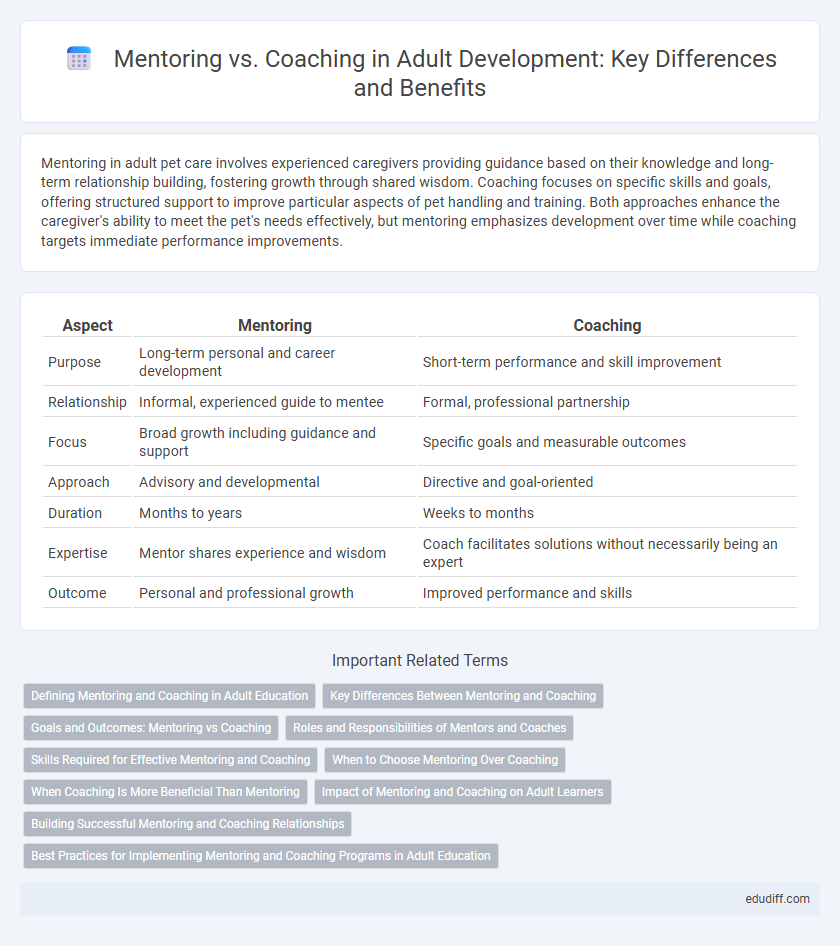Mentoring in adult pet care involves experienced caregivers providing guidance based on their knowledge and long-term relationship building, fostering growth through shared wisdom. Coaching focuses on specific skills and goals, offering structured support to improve particular aspects of pet handling and training. Both approaches enhance the caregiver's ability to meet the pet's needs effectively, but mentoring emphasizes development over time while coaching targets immediate performance improvements.
Table of Comparison
| Aspect | Mentoring | Coaching |
|---|---|---|
| Purpose | Long-term personal and career development | Short-term performance and skill improvement |
| Relationship | Informal, experienced guide to mentee | Formal, professional partnership |
| Focus | Broad growth including guidance and support | Specific goals and measurable outcomes |
| Approach | Advisory and developmental | Directive and goal-oriented |
| Duration | Months to years | Weeks to months |
| Expertise | Mentor shares experience and wisdom | Coach facilitates solutions without necessarily being an expert |
| Outcome | Personal and professional growth | Improved performance and skills |
Defining Mentoring and Coaching in Adult Education
Mentoring in adult education involves a seasoned professional providing long-term guidance, support, and knowledge transfer to foster personal and career development. Coaching focuses on specific skill enhancement and performance improvement through structured, goal-oriented sessions and feedback. Both methods are essential for empowering adult learners, with mentoring emphasizing relationship-building and coaching targeting targeted outcomes.
Key Differences Between Mentoring and Coaching
Mentoring involves a long-term relationship focusing on personal and professional development through guidance and experience sharing, while coaching is typically short-term and goal-oriented, emphasizing performance improvement and skill-building. Mentors provide advice based on their own career path and wisdom, whereas coaches use structured techniques and questioning to unlock the mentee's potential. The key difference lies in mentoring's holistic development approach compared to coaching's targeted, results-driven process.
Goals and Outcomes: Mentoring vs Coaching
Mentoring focuses on long-term personal and professional growth by providing guidance and wisdom from experienced individuals, often emphasizing career development and skill enhancement aligned with broader life goals. Coaching targets specific performance improvements and goal attainment through structured techniques, accountability, and actionable feedback within a defined timeframe. Both approaches enhance outcomes, with mentoring fostering sustained growth and coaching driving measurable, short-term results.
Roles and Responsibilities of Mentors and Coaches
Mentors provide long-term guidance by sharing personal experiences and fostering professional growth, while coaches focus on short-term performance improvement through goal-setting and skill development. Mentors act as advisors and role models, helping mentees navigate career paths and build networks, whereas coaches employ structured frameworks and feedback to enhance specific competencies. Both roles require active listening and support, but mentors emphasize relationship-building, contrasting with coaches' results-driven accountability.
Skills Required for Effective Mentoring and Coaching
Effective mentoring requires strong communication, empathy, and the ability to provide constructive feedback tailored to the mentee's growth. Coaching demands skills in goal-setting, active listening, and motivational techniques to drive performance improvement. Both roles benefit from emotional intelligence and adaptability to address individual learning styles and challenges.
When to Choose Mentoring Over Coaching
Choose mentoring over coaching when seeking long-term personal and professional growth through experienced guidance and relationship-building. Mentoring is ideal for individuals needing career development, emotional support, and knowledge transfer from a seasoned expert within the same field. Coaching suits short-term, goal-specific performance improvements, whereas mentoring fosters deep trust and ongoing development.
When Coaching Is More Beneficial Than Mentoring
Coaching is more beneficial than mentoring when specific skill development and performance improvement are the primary goals, especially in professional settings requiring measurable outcomes. It offers structured, goal-oriented sessions with feedback loops designed to enhance immediate competencies and accountability. Coaching is ideal for individuals seeking targeted support to achieve short-term objectives or navigate particular challenges efficiently.
Impact of Mentoring and Coaching on Adult Learners
Mentoring enhances adult learners' personal and professional growth by fostering long-term relationships that promote experiential learning and confidence building. Coaching accelerates skill acquisition and goal achievement through targeted feedback and structured development plans tailored to individual needs. Both approaches significantly improve motivation, self-efficacy, and career progression in adult education contexts.
Building Successful Mentoring and Coaching Relationships
Building successful mentoring and coaching relationships hinges on clear communication, mutual respect, and setting well-defined goals tailored to the individual's development needs. Effective mentors and coaches foster trust by providing consistent feedback and creating a supportive environment that encourages growth and accountability. Leveraging personalized strategies enhances skill-building and promotes long-term professional and personal success.
Best Practices for Implementing Mentoring and Coaching Programs in Adult Education
Effective mentoring and coaching programs in adult education require clear goal-setting tailored to learners' specific needs and career objectives. Establishing structured frameworks with defined roles, consistent feedback loops, and ongoing training for mentors and coaches enhances participant engagement and skill development. Leveraging technology for virtual sessions and progress tracking further optimizes program accessibility and measurable outcomes.
Mentoring vs Coaching Infographic

 edudiff.com
edudiff.com